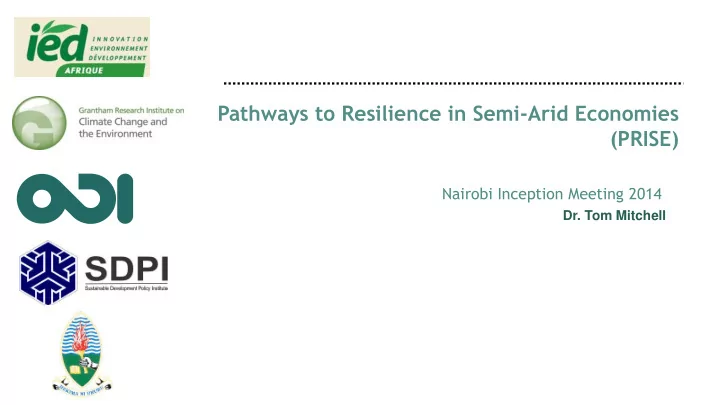

Pathways to Resilience in Semi-Arid Economies (PRISE) Nairobi Inception Meeting 2014 Dr. Tom Mitchell
PRISE Goal This research will support the emergence of equitable, climate resilient economic development in semi-arid lands through research excellence and sustained engagement with business leaders, local and national government decision-makers, civil society, and regional economic communities. 2
PRISE Objectives Objectives 1. Develop an evidence base on the impact of climate change on key factors conditioning the economic growth of semi-arid lands, and conversely how these factors condition vulnerability to climate change; 2. Develop an evidence base on the risks posed to economic growth in semi-arid lands by extreme climate events, particularly droughts and floods; 3. Identify investment, policy and planning measures for inclusive climate resilient development and growth in semi-arid lands; 4. Leverage existing initiatives and networks in a stakeholder engagement process that co-creates knowledge, builds credibility with research users, and promotes the uptake of results; 5. Support the emergence of a new cadre of policy-oriented researchers working on climate resilient development, engaged with key Southern institutions.
Country Focus • East Africa – Tanzania – Kenya • West Africa – Senegal – Burkina Faso • Central Asia – Pakistan – Tajikistan 4
Research Questions 1. How do current and future climate risks compound other environmental, social and economic stress factors in semi-arid regions, and how can these risks be managed? 2. How does climate resilient development as a strategy for poverty alleviation differ, in concrete terms, from the traditional recommendations of development policy, and how should adaptation be integrated into economic development policies? 3. What are the new opportunities for and threats to markets in SALs arising from climate change in semi-arid areas, and how is the private sector adapting? 4. How do natural resource management policies condition vulnerability and resilience in critical pathways between natural resources, economic growth and poverty alleviation? 5. How are climate impacts accelerating demographic changes and human endowments, and what are the implications for vulnerable groups to access benefits of markets and development? 5
Research Phases & Work Packages Inception Phase (Year 1) brings macro-level analysis of global semi-arid lands • (SALs) into dialogues with Stakeholder Engagement Platforms (SEPs) to identify case studies, pilot projects, and study sites. The Implementation Phase (Years 2-4) is divided into core 5 work packages • focussing on how crucial aspects of economies and societies condition vulnerability to, and are conditioned by, climate change. WP 4 WP 5 WP 1 WP 2 WP 3 Natural Human Climate Risk Governance Markets Capital Capital Lead: IED Lead: LSE Lead: ODI Lead: CCCS Lead: SDPI 6
PRISE Activities
Policy first approach Focusing on the practical knowledge needs of stakeholders, our policy first approach places practical and policy issues of development, rather than climate projections, at the centre of analysis.
Organogram IPAG Meet annually to advise and review on scientific/technical research direction Consortium Steering Committee IDRC Made up of Lead PI, CC and Co-Pis Grantees and Stakeholders CARIAA cross - consortia engagement WP1 WP 2 WP3 WP5 WP4 Committee Committee Committee Committee Committee Leader Leader Leader Leader Leader WP 1 WP 2 WP 3 WP 5 WP 4 WP1 WP 2 WP3 WP 5 WP4 Commissioned work to supplement work packages
Principal Investigators Role Individual Contact email Lead Principal Investigator Dr Tom Mitchell t.mitchell@odi.org.uk Consortium Co-ordinator Helen Mountfort h.mountfort@odi.org.uk Co-Principal Investigator IED Mamadou Bara GUEYE baragueye@iedafrique.org Co-Principal Investigator LSE Dr Samuel Fankhauser S.Fankhauser@lse.ac.uk Co-Principal Investigator SDPI Dr Abid Suleri suleri@sdpi.org Co-Principal Investigator ODI Dr Guy Jobbins g.jobbins@odi.org.uk Co-Principal Investigator CCCS Dr Pius Zebhe Yanda pyanda@gmail.com
Thank you
Recommend
More recommend